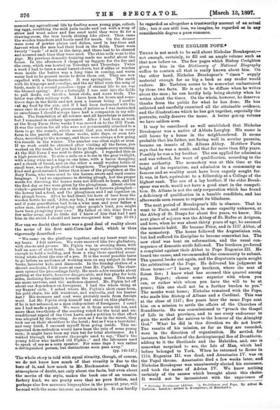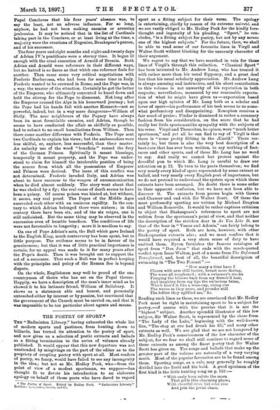THE ENGLISH POPE.*
THERE is not much to be said about Nicholas Breakspear,—. not enough, certainly, to fill out an ample volume such as
that now before us. The few pages which Bishop Creighton gives to him in the Dictionary of National Biography suffice to contain all that is really known about him. On the other hand, Nicholas Breakspear's " times " supply material enough for as big a book as any reader would endure. Mr. Tarleton seems to be somewhat embarrassed by these two facts. He is apt to be diffuse when he writes about the man ; he can hardly help being sketchy when he writes about the times. On the whole, however, he deserves thanks from the public for what he has done. He has collected and carefully examined all the attainable evidence, and the illustrations which he has got together, especially the portraits, really deserve the name. A better got-up volume we have seldom seen.
It may be considered as well established that Nicholas Breakepear was a native of Abbots Langley. His name is still borne by a house in the neighbourhood. It seems probable that his father, not faring well in secular pursuits, became an inmate of St. Albans Abbey. Matthew Paris says that he was a monk, and that for more than fifty years. Possibly he was a lay brother. The eon applied for admission and was refused, for want of qualification, according to the same authority. The monastery was at this time at the height of its reputation, and admission to a community so famous and so wealthy must have been eagerly sought for. It was, in fact, equivalent to a fellowship at a College of the highest rank. The son of a lay brother, if the elder Break- spear was such, would not have a good start in the competi- tion. St. Albans is not the only corporation which has found a deficiency of qualification in a humble candidate, and has afterwards seen reason to repent its blindness.
The next period of Breakspear's life is obscure. That he went to Paris, and remained, in some capacity unknown, at the Abbey of St. Denys for about five years, we know. His next place of sojourn was the Abbey of St. Rufus at Avignon, and here, when he was about thirty years of age, he assumed the monastic habit. He became Prior, and in 1137 Abbot, of the monastery. The house followed the Augustinian rule, but had suffered its discipline to become somewhat lax. The new chief was bent on reformation, and the usual con- sequence of domestic strife followed. The brethren preferred a complaint against their Abbot to Pope Engenius III. He heard the cause, and recommended the community to submit. The quarrel broke out again, and the disputants again sought the arbitration of the Pope. He delivered his judgment in these terms :—" I know, my brethren, where the seat of Satan lies ; I know what has aroused this quarrel among you. Depart; choose some superior with whom you can, or rather with whom you have the will to be at peace; this one shall not be a further burden to you." The monks went home; Nicholas remained with the Pope, who made him Bishop of Albano and a Cardinal. This was at the close of 1147 ; five years later the same Pope sent him on a mission to settle the affairs of the Churches of Scandinavia. He was commissioned to "preach the Gospel of Life in that province, and to use every endeavour to gain the souls of the natives to the honour of the Almighty God." What he did in this direction we do not know. The results of his mission, as far as they are recorded, were in the direction of organisation. He settled, for instance, the borders of the Archiepiscopal See of Drontheim, adding to it the Shetlands and the Hebrides, and, one is somewhat surprised to see, the Isle of Man, which had before belonged to York. When he returned to Rome in 1154, Eugenius III. was dead, and Anastasius IV. was on the Papal throne. Anastasius died a few weeks later, and Nicholas Breakepear was unanimously elected his successor, and took the name of Adrian IV. We know nothing certainly of the causes which brought about this choice. It would not be inconsistent with the experience of • Nickolas Breakspear (Adrian Rnelishman and Pope. By Alfred S. Tarlatan. London: Arthur L. LI Irani:rem of Hatchard
Papal Conclaves that his four years' absence was, to say the least, not an adverse influence. For so long, anyhow, he had not been making enemies or arousing jealousies. It may be noticed that in the list of Cardinals taking part in the Conclave, or at least living at the time, a majority were the creations of Eugenins, Breakspear's patron, and of his successor.
The four years and eight months and eight-and-twenty days of Adrian 1V.'s pontificate were a stormy time. It began ill enough with the cruel execution of Arnold of Brescia. Both Adrian and Arnold were reformers in their different ways, but no hatred is so fierce as that which one reformer feels for another. Then came some very critical negotiations with Frederic Barbarossa, who had been for some time in Italy. Frederic wanted to be crowned in Rome, and the Pope was, in a way, the master of the situation. Certainly he got the better of the Emperor, who ultimately consented to kneel down and hold the stirrup for the Pope to dismount. Not long after the Emperor crossed the Alps in his homeward journey ; but the Pope had his hands full with another Monarch—not so powerful, indeed, but in a way more dangerous—William of Sicily. The near neighbours of the Papacy have always been its most formidable enemies, and Adrian, though he seems to have conducted the affair as skilfully as possible, had to submit to no small humiliations from William. Then there came another difference with Frederic. The Pope sent two Cardinals to explain his views; but the ambassadors were less skilful, or, anyhow, less successful, than their master. An unlucky use of the word " beneficia " roused the fury of the German Princes. Spiritually it meant blessings, temporally it meant property, and the Pope was under- stood to claim for himself the intolerable position of being the source from which all the possessions of Emperor and Princes were derived. The issue of this conflict was not determined. Frederic invaded Italy, and Adrian was about to have recourse to the weapon of excommunication when he died almost suddenly. The story went about that he was choked by a fly; the real cause of death seems to have been a quinsy. Of coarse poison was hinted at, but without, it seems, any real proof. The Popes of the Middle Ages succeeded each other with an ominous rapidity. In the cen- tury to which Adrian belonged there were sixteen ; in this century there have been six, and of the six reigns, one is still unfinished. But the same thing may be observed in the succession even of humble benefices. The conditions of life were not favourable to longevity ; more it is needless to say.
On one of Pope Adrian's acts, the Bull which gave Ireland to the English King, much controversy has been spent, but to little purpose. The evidence seems to be in favour of its genuineness ; but that it was of little practical importance is certain, for no appeal was made to it for many years after the Pope's death. Then it was brought out to support the act of a successor. That such a Bnll was in perfect keeping with the principles and policy of the Roman See is beyond dispute.
On the whole, Englishmen may well be proud of the one countryman of theirs who has sat on the Papal throne. Happily, we have a description of the man's inner mind as he showed it to his intimate friend, William of Salisbury. It shows us a statesman able and honest, and personally untouched either by interest or by passion, but convinced that the government of the Church must be carried on, and that it was impossible to be too particular about agents and means.



































 Previous page
Previous page